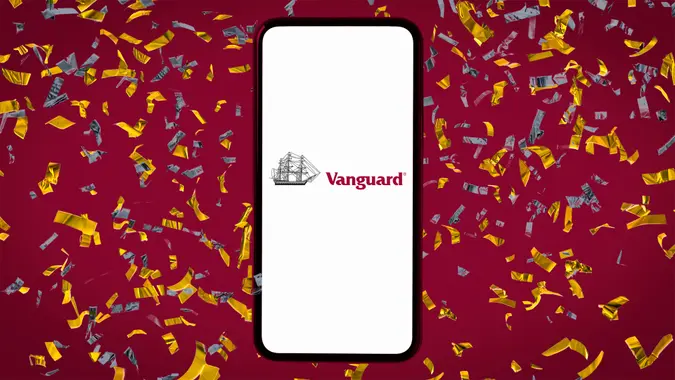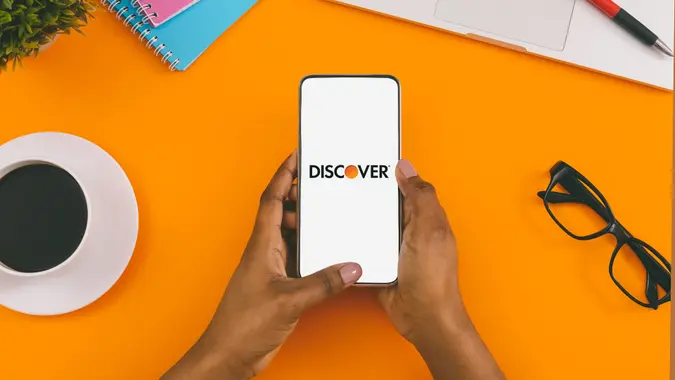What Is a CD Loan?

Commitment to Our Readers
GOBankingRates' editorial team is committed to bringing you unbiased reviews and information. We use data-driven methodologies to evaluate financial products and services - our reviews and ratings are not influenced by advertisers. You can read more about our editorial guidelines and our products and services review methodology.

20 Years
Helping You Live Richer

Reviewed
by Experts

Trusted by
Millions of Readers
A CD loan is a secured loan that lets you borrow money using a certificate of deposit as collateral. The funds you deposited into your CD continue to earn interest until maturity, while you repay the loan to your bank or credit union in installments. A certificate of deposit loan gives you immediate access to cash without having to close your CD early, which could trigger a penalty.
How a CD Loan Works
A CD secured loan uses your certificate of deposit account as collateral to borrow. Because the loan is backed by your funds, it usually comes with lower interest rates than an unsecured personal loan. Here’s how the process works.
Using Your CD as Collateral
When you take out a CD loan, the bank places a hold on your CD balance that’s equal to the loan amount. During the loan repayment period, you won’t be able to withdraw or access that portion of the funds. However, your CD continues to earn interest until it matures.
Loan Amount and Term
Your CD loan’s term is equal to the remaining term on your CD. For example, if you have a 12-month CD that you opened four months prior, your loan term will be eight months. Your lender will decide how much you can borrow, but the limit may be up to 100% of your CD’s value.
Interest Rates
CD lending rates tend to be lower than unsecured loan rates, since you’re giving the bank your certificate of deposit as collateral. Banks often set rates by adding a percentage — typically 2% to 3% — above the CD’s annual percentage yield. So if your CD has a 1.54% APY, your CD loan interest rate could be between 3.54% to 4.54% or higher, depending on your creditworthiness.
Repayment
CD loans are repaid in fixed monthly installments. If you make all payments on time, you’ll regain full access to your CD once the loan is paid off. However, missed payments could result in the bank seizing your CD funds to cover the balance you still owe.
When Does a CD Loan Make Sense?
A CD loan can make sense when you need to borrow. You can repay the loan in a relatively short time frame, and you’re interested in locking in a lower interest rate. CD loans can be more accessible than a home equity loan or HELOC, both of which are also secured, while costing less in interest than a traditional personal loan.
It might seem counterintuitive to take out an interest-bearing loan against an interest-bearing CD, but there can be some advantages. First, you have collateral readily available to you. That can shorten the timeline between application, approval and funding, which may be ideal if you need funds quickly.
Even though you’re paying interest, your CD savings continue to earn interest for the remainder of the CD term. While your loan rate may be slightly higher than the APY your CD earns, you could still pay a lower rate than you would for a personal loan or credit card. And on-time payments to a CD loan can help you build a positive credit history.
CD loans allow you to sidestep early withdrawal penalties, but there is some risk. If you don’t repay the loan in full, your lender could keep the remaining money in your CD account. However, that risk is avoidable if you’ve analyzed your budget to ensure you can afford CD loan payments.
| Consider a CD Loan If… | You Might Reconsider If… |
|---|---|
| You need to build or repair credit. | You need to borrow more than your CD is worth. |
| You want a lower interest rate. | The early withdrawal penalty on your CD is low. |
| You need funds quickly for a short-term need. | You can qualify for an unsecured loan with a good rate. |
| You don’t want to break your CD term. | You don’t have a stable repayment plan. |
To recap, CD loans are best suited for borrowers who:
- Are disciplined and have a clear repayment plan
- Want to preserve their CD savings, while improving their credit
- Have an immediate need for cash, but prefer to avoid CD early withdrawal penalties
A CD secured loan may be less attractive for someone with unpredictable income that could make budgeting for repayment difficult, or who is able to qualify for an unsecured loan with a lower rate.
How To Get a CD Loan in 4 Steps
Borrowing against a CD is usually a straightforward process, but if you need something more flexible, a savings account could be a better option. Here are the step:
1. Contact Your Financial Institution
Confirm with your bank that they offer CD loans — or share certificate loans if you have accounts at a credit union, as not all financial institutions do.
2. Gather Your Information
Be prepared to share details about your CD account with your lender, including the account number, interest rate and remaining maturity term.
3. Review the Loan Terms
Look over the loan terms carefully, including the amount you’re able to borrow, the interest rate, your monthly payment and any fees the lender may charge.
4. Apply and Receive Funds
Complete your lender’s loan application and provide any supporting documentation that might be needed, such as pay stubs or a copy of your ID. Approval may take just a few minutes or a few days, with funds deposited into your account after signing off on the loan paperwork.
CD Loans vs. Other Borrowing Options
If your bank or credit union doesn’t offer CD loans, you may have other ways to borrow. Here are some of the possibilities you could consider.
Unsecured Personal Loan
Unsecured personal loans let you borrow money for virtually any reason, with no collateral required. Loan limits may be as high as $100000 with some lenders. Approval for an unsecured personal loan hinges largely on your credit scores, and interest rates may be higher than what you’ll pay for a CD loan.
Early CD Withdrawal
If you’d rather not borrow, you could withdraw some or all of your CD savings early. Your bank or credit union may charge a penalty, which could be a flat fee or a percentage of the interest earned. This option could make sense if you’d pay less in penalties than you would in interest for a CD loan.
401(k) Loan
If you have a 401(k) at work, you may be able to take a loan from your balance. Retirement plan loans don’t require a credit check, so they’re easier to get. However, repayment rules are strict. Loans must be paid in full within five years. The money you withdraw will miss out on market growth, and if you don’t repay the loan on time, it’s treated as a taxable distribution.
Secured Credit Card
A secured credit card requires you to make a cash deposit that serves as collateral and also the amount of your credit line. Secured credit cards are primarily used for building or rebuilding credit rather than as a way to access cash, so a CD loan may be a better fit if you need to borrow.
Is a CD Loan Right for You? A Final Checklist
By now, the pros and cons of CD loans should be clear. As to whether getting one is right for you, a CD loan may be a good fit if:
- You have a clear plan to repay the loan on time.
- Your primary goal is to avoid early withdrawal penalties.
- You want to leverage a low-interest loan to build your credit history.
- You do not need to borrow more than your CD’s value.
To find out more, talk to your financial institution about what it can do for you, or check out other current CD rates that are available.
CD Loan FAQ
Here are the answers to some of the most frequently asked questions regarding CD loans.- How long is a CD loan?
- The length of a CD loan is usually based on your CD's maturity date. So if your CD matures in six months, your loan will be due in six months.
- Can you pay off a CD loan early?
- Yes, most CD loans allow you to pay them off early without any prepayment penalties. However, check with your lender to make sure.
- Are CD-secured loans reported to credit bureaus?
- CD-secured loans may be reported to credit bureaus, depending on your lending institution's policies.
- Can you cancel a CD loan?
- If you speak with your lender before your CD loan is approved and funded, then you should be able to cancel it. However, if your loan is already funded, you will have to pay off your loan.
- What happens to my CD when the loan is paid off?
- Once your CD loan is paid in full, the CD reaches maturity and you can withdraw the funds you deposited, plus the interest earned.
- Can I get a CD loan with bad credit?
- It's possible to get a CD loan with bad credit, however, you may pay a higher interest rate to borrow.
- Do all banks offer CD loans?
- No. You'll need to contact your bank or credit union to learn if CD loans are available.
- Will a CD loan affect my credit score?
- Yes, your credit score may drop a few points if your lender does a hard inquiry on your credit. Additionally, making timely payments can boost your credit score, whereas late payments can decrease it.
- Can I borrow against a CD I have at a different bank?
- If you have CDs at multiple banks, you could take out a loan at any of them, as long as the bank offers that option. CD loans at one bank will not affect CDs you hold at another bank.
- Are CD loans better than personal loans for bad credit?
- CD loans may allow people with bad credit to receive a lower interest rate than they would for a personal loan because CD loans are secured by the CD itself.
Cynthia Measom, Jami Young, John Csiszar, Jami Farkasand Jose Vazquezcontributed to the reporting for this article.
Our in-house research team and on-site financial experts work together to create content that’s accurate, impartial, and up to date. We fact-check every single statistic, quote and fact using trusted primary resources to make sure the information we provide is correct. You can learn more about GOBankingRates’ processes and standards in our editorial policy.
- AF Bank. "Certificate of Deposit (CD) Term Loans and How They Work."
- Experian. "What Is a CD Loan?"
- SoFi. "CD Loans Explained."
- PNC. "Secured vs. Unsecured Loans."
- Discover. "Tips for Using a Secured Credit Card."
- Capital One. "Secured Loan."
- Experian. 2023. "Alternatives to Personal Loans."
- Experian. 2024. "What Is a Hard Inquiry and How Does It Affect Credit?"
 Written by
Written by  Edited by
Edited by 

























